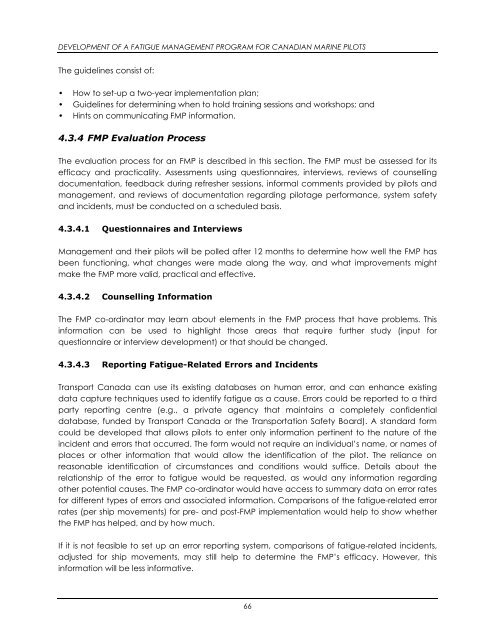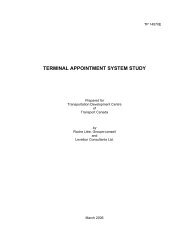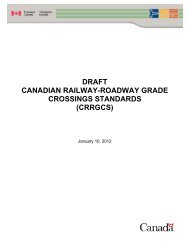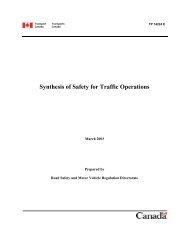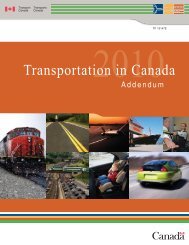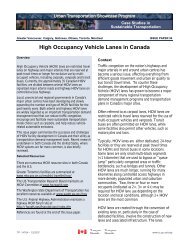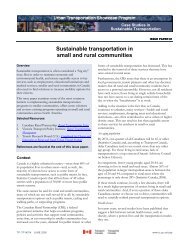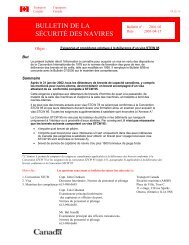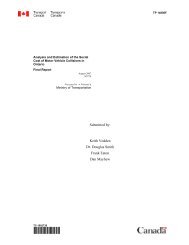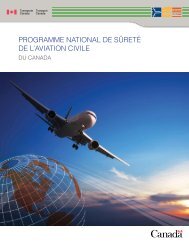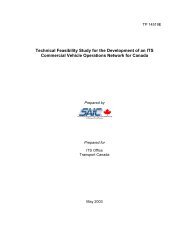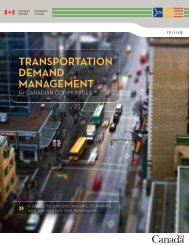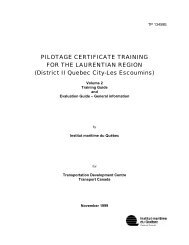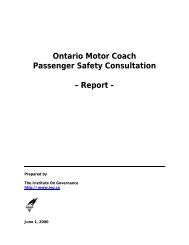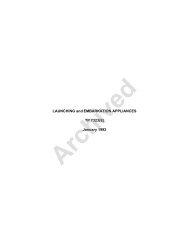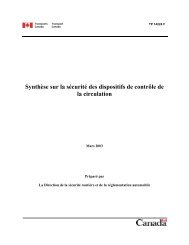Fatigue Management Program for Canadian Marine Pilots
Fatigue Management Program for Canadian Marine Pilots
Fatigue Management Program for Canadian Marine Pilots
Create successful ePaper yourself
Turn your PDF publications into a flip-book with our unique Google optimized e-Paper software.
DEVELOPMENT OF A FATIGUE MANAGEMENT PROGRAM FOR CANADIAN MARINE PILOTS<br />
The guidelines consist of:<br />
• How to set-up a two-year implementation plan;<br />
• Guidelines <strong>for</strong> determining when to hold training sessions and workshops; and<br />
• Hints on communicating FMP in<strong>for</strong>mation.<br />
4.3.4 FMP Evaluation Process<br />
The evaluation process <strong>for</strong> an FMP is described in this section. The FMP must be assessed <strong>for</strong> its<br />
efficacy and practicality. Assessments using questionnaires, interviews, reviews of counselling<br />
documentation, feedback during refresher sessions, in<strong>for</strong>mal comments provided by pilots and<br />
management, and reviews of documentation regarding pilotage per<strong>for</strong>mance, system safety<br />
and incidents, must be conducted on a scheduled basis.<br />
4.3.4.1 Questionnaires and Interviews<br />
<strong>Management</strong> and their pilots will be polled after 12 months to determine how well the FMP has<br />
been functioning, what changes were made along the way, and what improvements might<br />
make the FMP more valid, practical and effective.<br />
4.3.4.2 Counselling In<strong>for</strong>mation<br />
The FMP co-ordinator may learn about elements in the FMP process that have problems. This<br />
in<strong>for</strong>mation can be used to highlight those areas that require further study (input <strong>for</strong><br />
questionnaire or interview development) or that should be changed.<br />
4.3.4.3 Reporting <strong>Fatigue</strong>-Related Errors and Incidents<br />
Transport Canada can use its existing databases on human error, and can enhance existing<br />
data capture techniques used to identify fatigue as a cause. Errors could be reported to a third<br />
party reporting centre (e.g., a private agency that maintains a completely confidential<br />
database, funded by Transport Canada or the Transportation Safety Board). A standard <strong>for</strong>m<br />
could be developed that allows pilots to enter only in<strong>for</strong>mation pertinent to the nature of the<br />
incident and errors that occurred. The <strong>for</strong>m would not require an individual’s name, or names of<br />
places or other in<strong>for</strong>mation that would allow the identification of the pilot. The reliance on<br />
reasonable identification of circumstances and conditions would suffice. Details about the<br />
relationship of the error to fatigue would be requested, as would any in<strong>for</strong>mation regarding<br />
other potential causes. The FMP co-ordinator would have access to summary data on error rates<br />
<strong>for</strong> different types of errors and associated in<strong>for</strong>mation. Comparisons of the fatigue-related error<br />
rates (per ship movements) <strong>for</strong> pre- and post-FMP implementation would help to show whether<br />
the FMP has helped, and by how much.<br />
If it is not feasible to set up an error reporting system, comparisons of fatigue-related incidents,<br />
adjusted <strong>for</strong> ship movements, may still help to determine the FMP’s efficacy. However, this<br />
in<strong>for</strong>mation will be less in<strong>for</strong>mative.<br />
66


